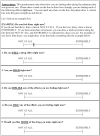The drug effects questionnaire: psychometric support across three drug types
- PMID: 23271193
- PMCID: PMC3624068
- DOI: 10.1007/s00213-012-2954-z
The drug effects questionnaire: psychometric support across three drug types
Abstract
Rationale: The Drug Effects Questionnaire (DEQ) is widely used in studies of acute subjective response (SR) to a variety of substances, but the format of the DEQ varies widely across studies, and details of its psychometric properties are lacking. Thus, the field would benefit from demonstrating the reliability and validity of the DEQ for use across multiple substances.
Objective: The current study evaluated the psychometric properties of several variations of DEQ items, which assessed the extent to which participants (1) feel any substance effect(s), (2) feel high, (3) like the effects, (4) dislike the effects, and (5) want more of the substance using 100-mm visual analog scales.
Methods: DEQ data from three placebo-controlled studies were analyzed to examine SR to amphetamine, nicotine, and alcohol. We evaluated the internal structure of the DEQ for use with each substance as well as relationships between scale items, measures of similar constructs, and substance-related behaviors.
Results: Results provided preliminary psychometric support for items assessing each DEQ construct (feel, high, dislike, like, and more).
Conclusions: Based on the study results, we identify several common limitations of extant variants of the DEQ and recommend an improved version of the measure. The simplicity and brevity of the DEQ combined with its promising psychometric properties support its use in future SR research across a variety of substances.
Similar articles
-
Validation of the Adolescent Drinking Expectancy Questionnaire and development of a short form.Drug Alcohol Rev. 2018 Mar;37(3):396-405. doi: 10.1111/dar.12567. Epub 2017 May 21. Drug Alcohol Rev. 2018. PMID: 28544257
-
Self-Criticism in the General Population: Development and Psychometric Properties of the Depressive Experiences Questionnaire Self-Criticism 4 (DEQ-SC4).J Pers Assess. 2023 Jan-Feb;105(1):74-86. doi: 10.1080/00223891.2022.2043878. Epub 2022 Mar 17. J Pers Assess. 2023. PMID: 35298312
-
Psychometric Aspects of the Depressive Experiences Questionnaire: Implications for Clinical Assessment and Research.J Pers Assess. 2018 Mar-Apr;100(2):207-218. doi: 10.1080/00223891.2017.1282493. Epub 2017 Mar 15. J Pers Assess. 2018. PMID: 28296508
-
[Validation study of the Depressive Experience Questionnaire].Encephale. 2003 Sep-Oct;29(5):445-55. Encephale. 2003. PMID: 14615694 French.
-
[Psychometric characteristics of questionnaires designed to assess the knowledge, perceptions and practices of health care professionals with regards to alcoholic patients].Encephale. 2004 Sep-Oct;30(5):437-46. doi: 10.1016/s0013-7006(04)95458-9. Encephale. 2004. PMID: 15627048 Review. French.
Cited by
-
Stimulating meditation: a pre-registered randomised controlled experiment combining a single dose of the cognitive enhancer, modafinil, with brief mindfulness training.J Psychopharmacol. 2021 Jun;35(6):621-630. doi: 10.1177/0269881121991835. Epub 2021 Mar 1. J Psychopharmacol. 2021. PMID: 33645313 Free PMC article. Clinical Trial.
-
Potential for limited reinforcing and abuse-related subjective effects of intranasal oxytocin.J Psychopharmacol. 2020 Mar;34(3):336-347. doi: 10.1177/0269881119867607. Epub 2019 Sep 2. J Psychopharmacol. 2020. PMID: 31475622 Free PMC article.
-
Evidence for incentive salience sensitization as a pathway to alcohol use disorder.Neurosci Biobehav Rev. 2019 Dec;107:897-926. doi: 10.1016/j.neubiorev.2019.10.009. Epub 2019 Oct 28. Neurosci Biobehav Rev. 2019. PMID: 31672617 Free PMC article. Review.
-
Threshold for the pleasurable effects of nicotine are lower than its reinforcing effects during self-administration.Exp Clin Psychopharmacol. 2023 Feb;31(1):37-45. doi: 10.1037/pha0000556. Epub 2022 Mar 7. Exp Clin Psychopharmacol. 2023. PMID: 35254839 Free PMC article.
-
Evaluation of US Food and Drug Administration-recommended abuse-potential questions in chronic pain patients without history of recreational opioid use: results and plan for research.J Pain Res. 2018 Dec 17;12:9-15. doi: 10.2147/JPR.S176950. eCollection 2019. J Pain Res. 2018. PMID: 30588075 Free PMC article.
References
-
- Cole-Harding S, de Wit H. Self-administration of pentobarbital in light and moderate alcohol drinkers. Pharmacol Biochem Behav. 1992;43:563–9. - PubMed
-
- Cox LS, Tiffany ST, Christen AG. Evaluation of the brief questionnaire of smoking urges (QSU-brief) in laboratory and clinical settings. Nicotine & Tobacco Research. 2001;3:7–16. - PubMed
Publication types
MeSH terms
Substances
Grants and funding
LinkOut - more resources
Full Text Sources
Other Literature Sources
Medical
Research Materials


